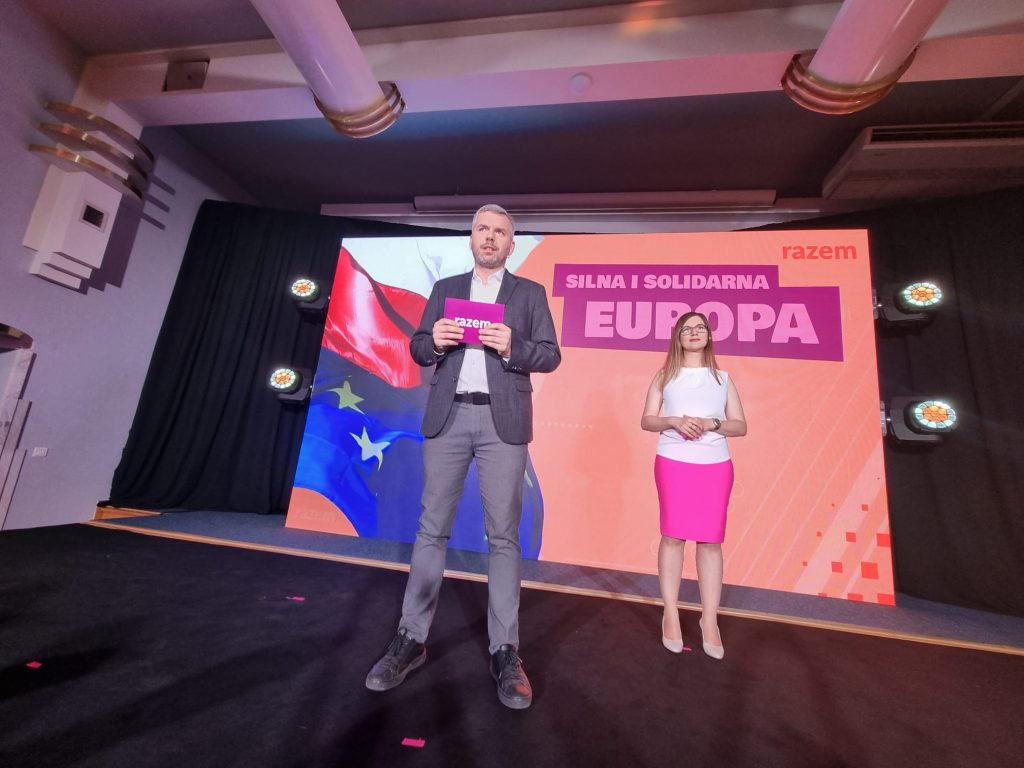
On June 17, Another Europe is Possible was invited to take part in a day of discussions with the international left, organised by Polish leftwing party Razem. The international day kick-started the party’s annual congress in Warsaw, taking place across the weekend.
The idea for the event had emerged as a direct response to debates and disagreements that Razem has had with sections of the European left following Putin’s invasion of Ukraine. In March, Razem announced that it was leaving Progressive International and Diem25 over the organisations’ failure to unequivocally condemn Russian imperialism and support Ukrainian sovereignty. However, it remained committed to the idea of building connections with socialists and progressives across borders – and the event was intended as a step towards that.
The opening panel focused on global solidarity in the face of imperialisms, and brought together speakers from Poland, Ukraine, Palestine, Kurdistan, Brazil and Switzerland. Much of the discussion focused on the links between the authoritarian right around the world, as well as between global struggles for self-determination. Speakers challenged the idea, still held by some on the left, of global politics as a struggle between two distinct camps. “US imperialists support Bolsonaro, who in turn supports Putin in the war,” pointed out a speaker from the Brazilian Socialism and Liberty Party (PSOL). Razem MP Maciej Konieczny added that Kremlin also funds influential Christian right groups in Poland that campaign against abortion and LGBT+ rights. Being opposed by NATO doesn’t automatically make the Putin regime an ally of the left, or even a lesser evil.
Meanwhile, Palestinian activist Fiona Ben Chekroun spoke about Palestine as a laboratory where global instruments of oppression are developed and tested. One of the big stories of the congress was Razem officially coming out in support of the BDS movement. While calling for tough sanctions on Russia, we realised that we needed to avoid double standards – explained Konieczny.
In the evening, there was a session discussing and sharing strategies for success. Representatives of the left from Ukraine, Poland, Hungary, Sweden and beyond spoke about their achievements and challenges they have faced. We talked about ways to neutralise right-wing “culture wars” by appealing to shared values and material interests, and speaking of real-life impacts of policies rather than abstract ideas. Swedish socialists spoke about the need to challenge reactionary narratives on immigration, including when adopted by the left; whereas representatives from the Ukrainian party Sotsіalniy Rukh emphasised the feminist aspects of their anti-war activism – such as drawing attention to the use of sexual violence as a weapon of war. There was also discussion about the basis for transnational organising on the progressive left: do we need formal structures, or can we simply coalesce around shared campaigns? One example of such coalition-building work brought up by the speakers was the international campaign to drop Ukraine’s foreign debt, which Razem (as well as Another Europe) has been actively involved in.
The international day set the tone for the congress, which saw Konieczny give a passionate speech for the need of a strong and transformed EU, and Ukrainian feminist and Sotsіalniy Rukh member Viktoria Pihul take the stage alongside Razem leaders during their media convention.
It was encouraging to see efforts to bring together the left across borders on the basis of radical, liberatory and consistently anti-imperialist politics. I hope it’s the beginning of a closer cooperation that will enable building stronger and more effective networks of solidarity.
18th July 2022
